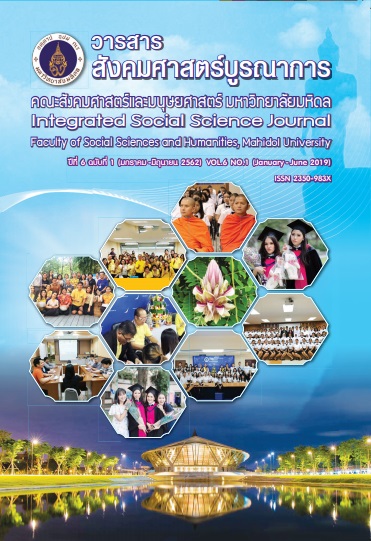Factors Influencing Voluntary Behaviors: Case Study of Thai Holistic Health Foundation
Main Article Content
Abstract
This research was aimed to examine (1) the level of the factors related to the voluntary behaviors of the volunteers in the Thai Holistic Health Foundation (THHF volunteers), (2) the level of the voluntary behaviors of the THHF volunteers, and (3) the relationships among the factors related to the voluntary behaviors of the THHF volunteers. The study sample consisted of 78 volunteers selected through accidental sampling out of the overall population of volunteers in the Project of “Developing the Quality of Children’s Life for Children in the Assistance Home by Voluntary Power.” The instrument of data collection was a questionnaire about the factors related to the voluntary behaviors.
The results revealed that (1) both personal and social factors related to the voluntary behaviors of THHF volunteers were at the high level; (2) the voluntary behaviors of THHF volunteers were at the high level; (3) the relationships between the personal factors and the voluntary behaviors were as follows: the self-directed learning correlated positively and significantly (p<.01) with the voluntary behaviors at the moderate level; the voluntary motivation correlated positively and significantly (p<.01) with the voluntary behaviors at the moderate level. The social factors including networks, family supports and volunteer models correlated positively and significantly (p<.05) with the voluntary behaviors at the moderate level. Through the stepwise multiple regression analysis, it was revealed that self-directed learning and voluntary networks could mutually predict volunteer spirit behaviors of the THHF volunteers as much as 34.7 percent.
Article Details
- Under a CC Attribution-NonCommercial-NoDerivatives 4.0 (CC BY-NC-ND 4.0) license, you can copy, distribute, display, perform, and use any published material (figures, schemes, tables or any extract of a text) for any purpose other than commercially (unless you get permission first).
- Any opinions and views expressed in this publication are the opinions and views of the authors, and are not the views of or endorsed by the journal (including the editor, any member of the editorial team or editorial board, and any guest editors).
- The editor has the right to edit the content of the manuscript to make it suitable for publication.
References
จำกัด.
เขมณัฏฐ์ มิ่งศิริธรรม. 2552. “การเรียนรู้ด้วยการนำตนเองบนเครือข่าย Self-directed Learning On
web-based Learning.” วารสารการศึกษา มหาวิทยาลัยขอนแก่น 32(1): 6-13.
เครือข่ายจิตอาสา (Volunteer Spirit Network). 2558. รายงานสถานการณ์งานอาสาสมัครประเทศ
ไทย นโยบายและส่งเสริมงานอาสาสมัครระดับชาติ งานประชุมระดับชาติด้าน
การอาสาสมัครครั้งที่ 1 วันที่ 8 พฤษภาคม 2558 (Online).
http://www.volunteerspirit.org/file/ncv/R8AMe.pdf, 20 กรกฎาคม 2560.
คมนา วัชรธานินท์. 2546. ปัจจัยเชิงเหตุและผลที่เกี่ยวข้องกับพฤติกรรมอาสาสมัครพัฒนาของ
นักศึกษามหาวิทยาลัย. วิทยานิพนธ์ศิลปศาสตรมหาบัณฑิต สาขาวิชาพัฒนาสังคม,
สถาบันบัณฑิตพัฒนบริหารศาสตร์.
ชูศักดิ์ เอื้องโชคชัย และคณะ. 2559. “คุณลักษณะการเป็นบุคคลแห่งการเรียนรู้ตลอดชีวิตสำหรับเยาวชน
ไทย The Characteristics of Lifelong Learners for Thai Youth.” วารสารครุศาสตร์ 4(44): 63-80.
ณัฐณิชากร ศรีบริบูรณ์. 2550. การพัฒนาโมเดลเชิงสาเหตุของจิตอาสาของนักเรียนมัธยมศึกษา
ตอนปลายในโรงเรียนสังกัดคณะกรรมการการศึกษาขั้นพื้นฐาน. วิทยานิพนธ์
ครุศาสตรมหาบัณฑิต สาขาวิชาวิจัยการศึกษา, จุฬาลงกรณ์มหาวิทยาลัย.
ดวงเดือน พันธุมนาวิน. 2538. ทฤษฎีต้นไม้จริยธรรม: การวิจัยและการพัฒนาบุคคล.
กรุงเทพมหานคร: สถาบันบัณฑิตพัฒนบริหารศาสตร์.
ธิดาชนก วงค์พิทักษ์. 2556. ปัจจัยจิตสังคมที่ส่งผลต่อพฤติกรรมจิตอาสาของนิสิตมหาวิทยาลัย
ศรีนครินทรวิโรฒ. สารนิพนธ์การศึกษามหาบัณฑิต สาขาวิชาจิตวิทยาพัฒนาการ,
มหาวิทยาลัยศรีนครินทรวิโรฒ.
พระไพศาล วิสาโล. 2550. ศาสตร์และศิลป์แห่งการจัดการความดี ศึกษากรณีมูลนิธิพุทธฉือจี้.
กรุงเทพมหานคร: พริกหวานกราฟฟิค จำกัด.
ไพบูลย์ วัฒนศิริธรรม และ สังคม สัญจร. 2543. สำนึกไทยที่พึงปรารถนา. กรุงเทพมหานคร:
มูลนิธิบูรณะชนบทแห่งประเทศไทย.
มิชิตา จำปาเทศ รอดสุทธิ. 2550. จิตอาสาคืออะไร. ประชาติธุรกิจ ตอนที่ 38 (online). http:
//www.hs1an.org/index.php?option=com_content&task=view&id=601&Itemid=49,
4 มีนาคม 2560
มูลนิธิสุขภาพไทย. 2559. อาสาสร้างสุขให้เด็กในสถานสงเคราะห์ (Online).
http://www.volunteerspirit.org/?event=, 9 สิงหาคม 2560.
ศุภารัตน์ รัตนมุขย์. 2546. อาสาสมัคร : การพัฒนาตนเองและสังคม (Online).
http://www.volunteerspirit.org/files/volunteer%20and%20human.pdf,
17 มิถุนายน 2560.
สมสุดา ผู้พัฒน์ และ จุฬารัตน์ วัฒนะ. 2544. “อิทธิพลของการอบรวมเลี้ยงดู การไปวัด
การรักษาศีล 5 และการนั่งสมาธิ ต่อความกตัญญูกตเวที.” วารสารเกษตรศาสตร์ (สังคม)
22: 126-138.
สมโภชน์ เอี่ยมสุภาษิต. 2539. ทฤษฎีและเทคนิคการปรับพฤติกรรม. พิมพ์ครั้งที่ 2.
กรุงเทพมหานคร: จุฬาลงกรณ์มหาวิทยาลัย.
อรพินทร์ ชูชม และคณะ. 2549. “การวิเคราะห์ปัจจัยทางจิตสังคมที่สัมพันธ์กับจิตสำนึกทางปัญญาและ
คุณภาพชีวิตของเยาวชนไทย.” วารสารพฤติกรรมศาสตร์ 12(1): 15-35.
อนุ เจริญวงศ์ระยับ. 2552. การรับรู้สภาพแวดล้อมภายในสถานศึกษาและลักษณะส่วนบุคคลที่
เอื้อต่อการเป็นอาสาสมัครอย่างยั่งยืนในนักศึกษาระดับปริญญาตรี. วิทยานิพนธ์
วิทยาศาสตรดุษฎีบัณฑิต สาขาวิชาการวิจัยพฤติกรรมศาสตร์และการประยุกต์,
มหาวิทยาลัยศรีนครินทรวิโรฒ.
อภิญญา ตันทวีวงศ์ และ ยุทธดนัย สีดาหล้า. 2557. อาสาสมัครในสถานสงเคราะห์พลังยกระดับ
อนาคตประเทศไทย. กรุงเทพมหานคร: มูลนิธิสุขภาพไทย.
อัปสรสิริ เอี่ยมประชา. 2542. การพัฒนาโปรแกรมเสริมสร้างการเห็นคุณค่าในตนเองของ
นักเรียนชั้นประถมศึกษาปีที่ 5. วิทยานิพนธ์ครุศาสตรมหาบัณฑิต สาขาวิชาจิตวิทยา
การศึกษา, จุฬาลงกรณ์มหาวิทยาลัย.
Barry, P.D. and A.J. Morgan. 1985. Mental Health and Illness. 3rd ed. Philadelphia:
J.B. Lippincott Company.


